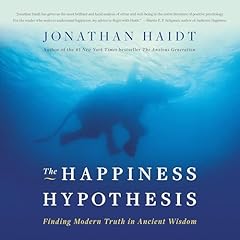
The Self Illusion
Why There Is No "You" Inside Your Head
No se pudo agregar al carrito
Add to Cart failed.
Error al Agregar a Lista de Deseos.
Error al eliminar de la lista de deseos.
Error al añadir a tu biblioteca
Error al seguir el podcast
Error al dejar de seguir el podcast
 Exclusivo para miembros Prime: ¿Nuevo en Audible? Obtén 2 audiolibros gratis con tu prueba.
Exclusivo para miembros Prime: ¿Nuevo en Audible? Obtén 2 audiolibros gratis con tu prueba.Compra ahora por $20.78
-
Narrado por:
-
Bruce Hood
-
De:
-
Bruce Hood
The Self Illusion provides a fascinating examination of how the latest science shows that our individual concept of a self is in fact an illusion. Most of us believe that we possess a self - an internal individual who resides inside our bodies, making decisions, authoring actions and possessing free will. The feeling that a single, unified, enduring self inhabits the body is compelling and inescapable. But that sovereignty of the self is increasingly under threat from science as our understanding of the brain advances.
©2012 Bruce Hood (P)2012 W F Howes LtdLos oyentes también disfrutaron:




















Reseñas de la Crítica
Las personas que vieron esto también vieron:




Incredibly Informative
Se ha producido un error. Vuelve a intentarlo dentro de unos minutos.
Excellent
Se ha producido un error. Vuelve a intentarlo dentro de unos minutos.
A great read!
Se ha producido un error. Vuelve a intentarlo dentro de unos minutos.
What made the experience of listening to The Self Illusion the most enjoyable?
Hood is a great writer I highly recommend the ride into the exploration of the illusion of self. Even if you are well vs in the subject you will find Hood's treatment of the social aspects of self thought provoking, Hood even puts an interesting spin on gender biases, beyond testosterone and estrogen.Who was your favorite character and why?
The Brain, it is after all your reality generator.What about Bruce Hood’s performance did you like?
Sounds Great at 2xWas this a book you wanted to listen to all in one sitting?
No. Your bound to want to reflect. Even coming back to it in a few days is a good ideaAny additional comments?
You own it to yourself to listen to this bookIt’s ok to believe in illusions
Se ha producido un error. Vuelve a intentarlo dentro de unos minutos.
great book and narration!
Se ha producido un error. Vuelve a intentarlo dentro de unos minutos.


